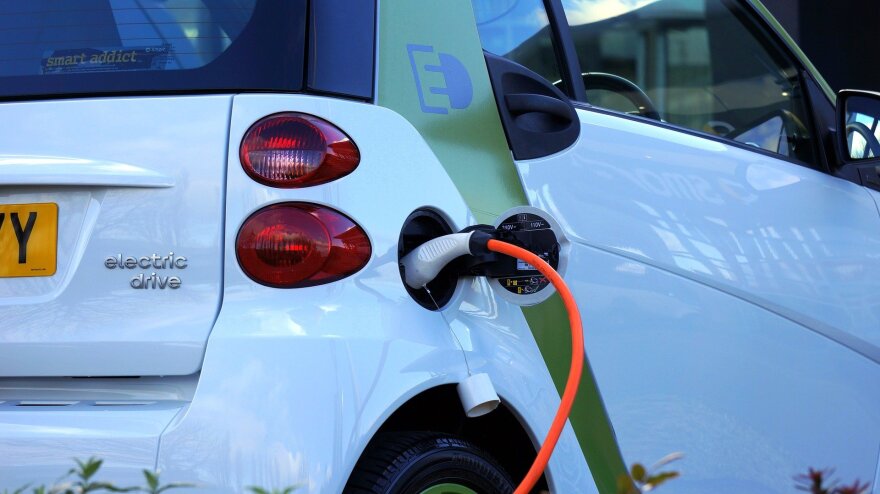A patchwork of states have joined in an effort to modernize transportation along the East Coast and reduce gas emissions that contribute to climate change. This Transportation and Climate Initiative would also bring more electric vehicles (EVs) to New England roads and changes to the region’s power grid.
Everyday feels like an electric car show in Westport, Connecticut. The town has more EVs on the road per person than anywhere else in the state, and it's adding more all the time.
“We're a relatively new player in town,” said Jeff Curry, an executive at Lucid Motors, a luxury EV maker that started as a powerhouse in battery storage. They opened a New York City showroom where Connecticut residents look to buy from.
“We're really trying to take electric vehicle technology on,” he said, “so that there's more choice even for consumers who are demanding things like a car that can go over 500 miles on a single charge, working at 300 miles in just 20 minutes. So it can go farther and charge faster.”
An electric car like what Curry’s company makes is outfitted to be charged at nearly 3,000 high-speed public charging outlets across the country. And at hundreds of miles between charging stations, being able to go the distance matters.
President Joe Biden’s $2 trillion infrastructure plan would build a network of thousands of additional charging stations in the U.S. Curry said that's good news for companies like his.
“This really is about electrifying the future and getting more sustainable choices to consumers across the country,” Curry said.
The push for more EVs at state and federal levels could significantly change the amount of power that New England is expected to need in the next decade and beyond, said Ann George, a spokesperson for ISO New England, the operator of the regional electric grid.
“That is going to change the nature of demand for electricity, both in terms of the amount that's being demanded from the electricity system,” George said, “but also when and where it's being asked to draw on the system.”
Until roadside chargers are more available in New England, 80% of charging will be done at home at night, according to the U.S. Department of Energy.
“It actually is a great time to put load on the system or energy consumption,” said Roger Kranenburg, vice president of energy policy at Eversource.
He said the electric grid is far from its peak demand at night and will be able to power EVs with energy that’s already stored in a battery at home or at a substation.
“Because it's a little bit like a hotel, the network's built,” Kranenburg said. “But if we're able to use that network more by putting more use at a time that no one else is using the network, then it spreads the cost of that network over a wider base.”
Eversource has joined other utilities to build a national network of fast charging stations — similar to Biden’s plan. That effort is already underway in Massachusetts, and could launch in Connecticut and New Hampshire this year.
Kranenburg said more EVs means less need for fossil fuels at the pump or driving gas-guzzlers that contribute to 40% of greenhouse gas emissions in New England. And states like Massachusetts and New Jersey plan to pour tens of millions into clean transportation projects.
“A car of your future would be fueled by offshore wind,” he said.
Barry Kresch, the leader of the EV Club of Connecticut who lives in Westport, the EV hotspot, said now is the time for the rest of New England to release the brakes on EV growth. And he wants Connecticut to pass a law allowing residents to buy EVs directly from manufacturers like Massachusetts and New Hampshire can.
“The friction of the current environment is holding us back from hitting ambitious EV adoption goals the state has set for it,” Kresch said.
Senator Will Haskell, who chairs the state’s transportation committee, said this bill would help Connecticut meet its goal to increase EVs on the road 10-fold by 2025.
“Increased competition leads to not just more people behind the wheel of electric vehicles, not just electric vehicles that are more affordable, but it leads to employment growth at dealerships that leads to more dealerships and more jobs,” even though car dealerships would rather they remained the middleman, he said.
Dealers say they are committed to selling 40 different models of electric vehicles even though most don’t.
Haskell said this bill would help drive growth in the region.
“The next generation is looking to Hartford and wondering whether or not we're going to step up for clean air and clean water and to protect our natural resources,” he said. “The governor this year is pushing the Transportation Climate Initiative and investment that would bring tens of millions of dollars to EV infrastructure charging stations across the state.
“But what good will that do if we don't have cars to charge?” he asked.
Haskell said more choice for EVs and more places to charge them, that could be where the rubber meets the road.



